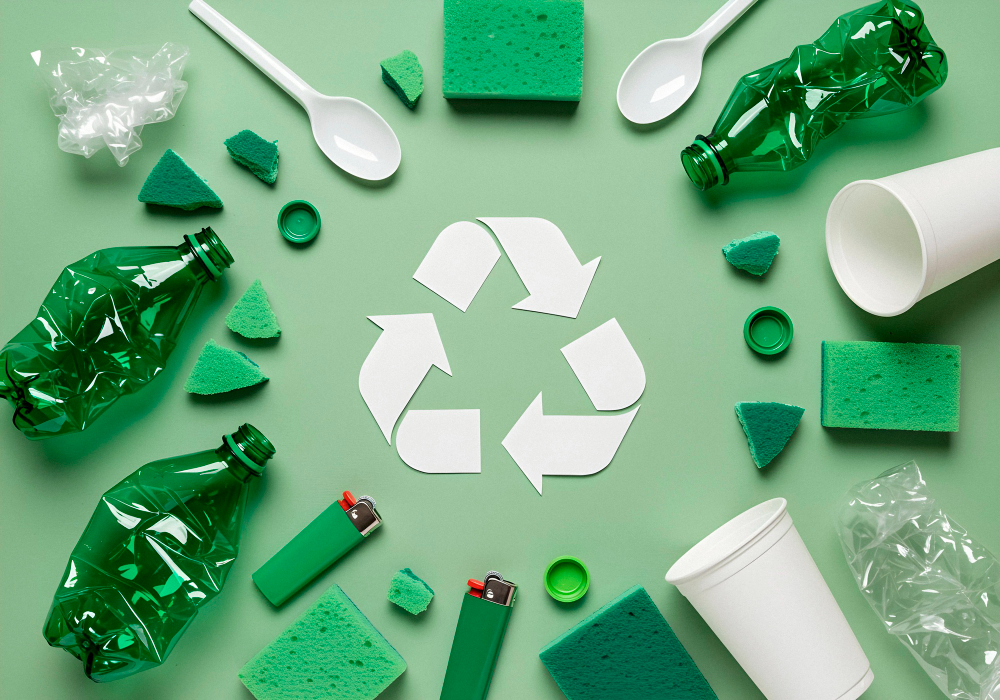
Recycling has become second nature for many households and businesses, but misconceptions about what can and can't be recycled continue to circulate. These myths can lead to contaminated recycling bins, increased processing costs, and materials ending up in landfills despite good intentions.
Understanding the facts about recycling helps you make better decisions for the environment while supporting efficient waste management systems. Whether you're managing household waste or overseeing a business's sustainability efforts, separating recycling fact from fiction ensures your efforts actually make a difference.
Let's examine some of the most persistent recycling myths and reveal what really happens to the materials you put in those bins.
One of the biggest misconceptions is that any item with a recycling symbol can be processed through standard recycling programs. The numbers inside those triangular symbols on plastic containers actually indicate the type of plastic resin used, not whether the item is recyclable in your area.
Most municipal recycling programs accept plastics numbered 1 and 2 (water bottles, milk jugs, and detergent containers). However, plastics 3 through 7 often require specialized processing that isn't available everywhere. Items like plastic bags, styrofoam containers, and certain food packaging may bear recycling symbols but can jam sorting equipment or contaminate other recyclables.
Before tossing plastic items into your recycling bin, check with your local recycling service to understand which plastics they accept. Many grocery stores offer separate collection points for plastic bags and films that can't go in curbside programs.
Many people believe containers must be spotless before recycling, leading some to skip recycling altogether rather than rinse items. While cleanliness matters, you don't need to achieve dishwasher-level spotless results.
The key is removing most food residue and liquids. A quick rinse with water is usually sufficient for containers like pasta sauce jars, yogurt cups, and aluminum cans. However, heavily soiled items or those with sticky residues can contaminate entire batches of recyclables during processing.
Grease-soaked pizza boxes present a special case. While the clean portions can be recycled, sections with significant grease stains should be removed or composted if possible. The grease can interfere with the paper recycling process and affect the quality of new products made from recycled materials.
Electronics like old smartphones, batteries, and small metal components seem like they should go in standard recycling bins, but these items require specialized processing. Batteries can leak hazardous chemicals and potentially cause fires in recycling facilities. Electronic devices contain valuable metals that can be recovered, but they also include components that need careful handling.
Many retailers, including electronics stores and big-box retailers, offer take-back programs for small electronics and batteries. These programs ensure proper processing and material recovery while keeping hazardous substances out of standard waste streams.
Similarly, items like bottle caps, while technically recyclable, can fall through sorting equipment and end up contaminating other materials. Some facilities now accept bottle caps if they're left on containers, while others prefer them removed.
Glass recycling seems straightforward, but color separation plays a crucial role in creating new products. Clear, brown, and green glass have different chemical compositions and melting points. When mixed, they can create inferior recycled products or limit the types of new items that can be manufactured.
Many recycling services separate glass by color during collection or processing. However, some programs struggle with mixed-color glass, which is why you might see separate bins for different glass colors at drop-off locations. Broken glass, while still recyclable, requires careful handling and should be contained in bags or boxes to protect workers.
Window glass, mirrors, and light bulbs have different compositions than container glass and typically can't be processed through standard glass recycling streams. These items need special handling due to coatings, treatments, or different glass formulations.
While recycling generally benefits the environment, the process isn't automatically carbon-neutral. Transportation, sorting, cleaning, and reprocessing all require energy. For some materials and locations, the environmental cost of recycling may outweigh the benefits, especially if items must be shipped long distances for processing.
This doesn't mean you should abandon recycling efforts. Instead, focus on the waste hierarchy: reduce consumption first, reuse items when possible, then recycle. Buying products with minimal packaging, choosing reusable alternatives, and maintaining items longer often have greater environmental benefits than recycling alone.
Quality matters more than quantity in recycling. A bin filled with clean, properly sorted materials creates more environmental benefit than a larger bin contaminated with non-recyclable items that can ruin entire batches.
Understanding your local recycling program's specific requirements maximizes the impact of your efforts. Recycling guidelines vary significantly between municipalities and service providers based on their processing capabilities and market conditions for recycled materials.
Contact your recycling service directly to get current information about accepted materials and preparation requirements. Programs frequently update their guidelines as technology and markets evolve, so information from even a year ago might not reflect current practices.
Consider conducting a waste audit to identify which materials you generate most frequently. This helps you make informed decisions about purchasing and disposal while highlighting opportunities to reduce waste generation overall.
Effective recycling requires understanding both environmental goals and practical limitations of local processing systems. Professional recycling services can provide guidance tailored to your specific situation and local capabilities.
If you're looking for a recycling service in New Jersey, contact All County Recycling today to schedule a consultation. Their expertise can help you develop effective waste management strategies that actually achieve your environmental goals while meeting regulatory requirements.